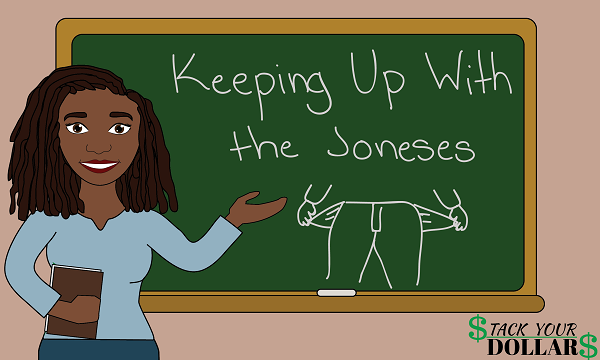“If all your friends jumped off a cliff, would you do it too?” Most of us have grown up hearing this question. Similarly, “Keeping up with the Joneses” is a phrase that comes from a comic strip by the same name in 1913. It means being like others by trying to match their social standing and material possessions.
Everyone wants to just “go with the flow”, and be cool and trendy. But is this really the way to live life?

Meaning and Origin
In 1913, Arthur R. “Pop” Momand created a comic strip called, “Keeping Up With The Joneses.” The comic ran for 24 years from 1913 to 1938.
It showed the lives of the McGinis family who were trying to social climb by keeping up with their neighbors, the Joneses. They judged their own social standing by how their lifestyles and material goods compared to their neighbors.
It was actually based on the cartoonist’s own experience of trying to do this while living in Nassau County, New York.
Though the comic strip is relatively unknown today, it has become a common catchphrase. “Keeping up w/ the Joneses” has come to mean trying to have (or do) what others that are popular are.
“Keeping Up With The Kardashians” is a popular television show that remixes this phrase.
Social Effects
What is meant by the phrase “keeping up with the joneses” and how does this concept impact savings habits?
Social influence drives people to want to conform to the standards set by the majority. From fads like the popular challenges (mannequin, ice bucket, etc) to following the latest fashion trends; everyone just wants to fit in.
While there’s nothing “wrong” per se about trying to “be normal”, there has to be limits. This mentality drives the “normal” trend toward materialism and conspicuous consumption.
Conspicuous consumption is the term used for spending money on luxury goods and services to display to others how “rich” you are. Meaning, if you can’t afford to buy the hottest designer labels and go to the best restaurants, then you can’t sit at the cool kids’ lunch table.
This sets a priority on spending money instead of the habit of saving money.
Advertising
Trying to keep up with the Joneses is not only a bad way to determine your self-worth, but it also leads to living beyond your means and can send you into debt.
For a long time now, businesses have been using celebrity endorsements as a marketing tool to drive their sales. One research study said that “participants aspire to the lifestyles of certain celebrities; copying their fashion and makeup styles, types of posts, or choices of restaurant and holiday destinations.” It concluded that advertisers should choose celebrities based on who their targeted consumers would relate to.
You can see this all across television and most recently social media as well. These influencers are used to push everything under the sun from jewelry to all of the weight loss products I see every time I open Instagram.
Allowing yourself to be influenced by their lifestyle and trying to imitate them will have you spending money you don’t need to. According to TransUnion reports, the average debt per borrower is $5,554. These are expenses that you could use to build a strong emergency fund, save for homeownership, or retire before the average age of 62.
Rejecting The Joneses: How To Stop Comparing Yourself
So how do we stop? How can escape the habit of “Keeping Up With The Joneses”? This obsession to have the biggest and flashiest things is just stressful. There will always be someone that seems to be richer and happier than you are.
“If you live for having it all, what you have is never enough.” —Vicki Robin
With this abundance of THINGS, is also the pressure to keep working and making more money to maintain that lifestyle. Having a big mansion and the flashiest cars looks nice, but what’s not nice is going broke and in debt to have it.
There are many people living paycheck to paycheck and/or working multiple jobs just to afford their way of living. So how can we be happier with our own intrinsic value? It’s hard to escape the materialistic worldview, but here are some suggestions:
1. YOU are enough.
Realize that you deserve to be seen for who you are, and not for the value of the items that you own. Your belongings do not define your character.
Yes, this sounds cheesy, but if everything you owned burned up in a fire, what would you have left? Yourself!
2. Don’t be afraid to go against the grain.
If all your friends are jumping off that cliff, don’t jump with them. Make financial decisions based on what is best for yourself, your lifestyle, and your financial future.
It may turn out that taking that dive (aka buying something expensive) is okay, but come upon that conclusion yourself instead of basing it on what others are doing.
And FYI, if your friends desert you because you’re making different choices, they are not friends who really value you for you.
3. Treasure experiences over objects.
Everything that glitters isn’t gold, and your material possessions won’t fill any void in your life. A study on aspiring for financial success has shown that materialistic worldviews correlate to lower self-actualization, less vitality, more anxiety, and more depression.
Experiences are the memories we look back on with happiness, not the $50 shirt bought 10 years ago. Find true joy in the experiences shared with those around you.
4. Limit television
Not only is television filled with advertisements, but so are the shows themselves. Every time that you see a brand being displayed in a show, that is a form of subliminal advertisement known as product placement.
My favorite example of this form of advertising comes from the 1982 movie, E.T. the Extra-Terrestrial. The candy, Reese’s Pieces, was new and not widely bought before the release of this movie.
Nevertheless, when E.T. became a hit in theaters, the sales of the peanut butter candy dramatically increased; some say the company’s revenue tripled! All this was thanks to Elliot using the candy to lure E.T.
This brings me back to my point, advertisements are all around you whether you notice it or not. Challenge yourself to cut back on the amount of television you watch. I know it’s not easy, I used to watch T.V. all day and every day. Now, I listen more to music and free audiobooks downloaded from my local library.
5. Cut back on the Internet & Social Media
Just like television, the internet, and social media are also bad for your wallet. Internet providers track your browsing history and spending habits to figure out what you are interested in. Once they know this, they target advertisements specifically for you.
Have you ever looked up something, only to see a commercial or ad about it later on? I know I have! Comment below with your experience! My own happened when I was looking up natural flea remedies, the very next day, there was a pet store ad on tv for flea medication! Whoa!
Social media influencers are also paid to be brand ambassadors for different products. They take pictures and post videos using them on social media as part of their contracts. Their goal is to make the people who follow them buy these products.
It will be easier to keep your eyes on the prize (your goals) if you avoid advertising by social media influencers and others online.
6. Recognize that celebrities go broke too.
Understand that celebrities you admire who are spending these extravagant amounts of money end up going broke as well. In their time being rich and famous, they spend all this money to show the world how successful they are (again, conspicuous consumption).
However, everyone has their time in the spotlight, and without making smart investments, their money goes away. If you’re not careful, you could end up following that as well.
The following video shows financial advice from the rapper, Kevin Gates. I don’t know much about this celebrity, but I came across this video and found it inspirational. I hope something within it inspires you as well.
In the video, Kevin Gates admits that he spent millions on clothes, jewelry, and cars to make himself feel better because he was “insecure and fat”. His turning point came when he went away to prison and was unable to make money, there was none left to support his pregnant wife and child.
Here are a few quotes by him throughout the clip:
- “If you can’t buy it ten times, you don’t need it.”
- “Instead of watching every dime, watch every penny.”
- “When you really need it you don’t have it because you spend it on nothing but BS. You have to save your money so that one day your money can save you.”
Keeping Up With Yourself: How To Change Your Mentality
“It is not the man who has too little, but the man who craves more, that is poor.” —Seneca
So now that we know the grass isn’t greener on the other side, how do we water our own? If the Joneses’ lifestyle and being in debt isn’t what you want, here are some steps to improve yourself.

1. Stop living beyond your means
If you’re spending more than you make every month, you are living beyond your means. You should not have to go into debt by borrowing money or using your credit card until your next paycheck.
Track your expenses every month and cut back on unnecessary spending habits. With a good budget, you can know when it’s okay to treat yourself and still live a comfortable life.
2. Create a budget
Invest in yourself and your future first by creating a budget. With my own, we save at least 20% of our household income before allocating the rest to bills and the things we want.
Managing your finances will allow you to spend less and save more money.
3. Buy used items
If there is something you need, see if you can buy it used first. I’ve found great furniture at thrift shops, resale websites, and apps.
While I don’t suggest upholstered furniture (due to bedbugs), I have bought other items for a great deal. The wood dining table I purchased for $100 has remained in great condition throughout moving 5 times.
4. Declutter
Take stock of everything that you own. What is just sitting there and collecting dust? Do you even like that pair of shoes anymore?
Seeing all the things you have and don’t use anymore can be an eye-opening experience. I love to buy new clothes, but I stopped once I realized how many things I barely wear.
Every piece is money wasted to just sit in my dresser and closet. Now, that is what I think about every time I see a new advertisement online for my favorite stores.
5. Reflect on your motivations
Take the time to consider why you really want to buy something before doing so. Materialism makes you want to purchase the best, but is it what is best for you?
For example, let’s say you’re buying a new laptop. All the fancy new technology, doodad, and doohickeys sound great, but are you going to use them? If you’re only checking emails and other basic tasks, probably not.
Even buying designer labels is okay if it’s within your budget; however, your motivation to buy it should be because you like the style and not to show off to others.
6. Practice gratitude
Every day, give thanks for what you do have instead of obsessing over the things you don’t.
Your bed might not be gilded in gold, but you had somewhere to sleep last night. As long as you have the “essentials” (shelter, food, water), all of your needs are met.
Remember, some people don’t even have those necessities. They say that you don’t miss what you have until it’s gone, and everything can be taken away quicker than you can think.
Changing from this negative mindset of wanting more to a more positive one will be more freeing and leave you happier. What are you appreciative of in your life?
And with that, say goodbye to the “Keeping Up With The Joneses” mentality. Constantly comparing yourself to them will only keep you down. What are your experiences in trying to live like the Joneses?
